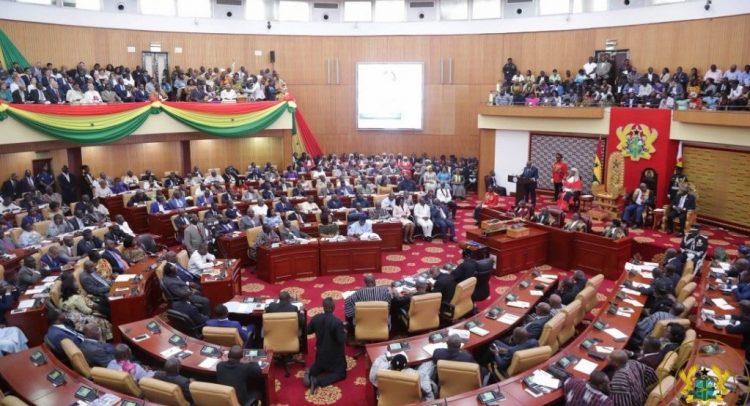Parliament of Ghana
PARLIAMENT ON Thursday night, March 19, 2020, adopted the report of the Committee on Constitutional, Legal and Parliamentary Affairs that recommended the Imposition of Restrictions Bill, 2020, to be passed under a certificate of urgency.
Chairman of the Committee, Ben Abdallah Banda, who is also the Member of Parliament (MP) for Offinso South Constituency, led the move, which the House approved by a voice vote in the face of sustained criticism from the opposition MPs.
The Bill was due to be considered by the House later on Friday, March 20, 2020, and would need its approval to become law.
It came as President Akufo-Addo directed for the suspension of all public and social gatherings in the country, in a bid to contain the spread of the coronavirus.
Ghana has 11 confirmed cases of coronavirus with three of its citizens killed by the virus in Italy and Denmark.
Purpose of Bill
The emergency legislation, designed to provide powers for the President to impose restrictions on persons in the event of a disaster, emergency or similar circumstance, to ensure public safety and protection, was presented to Parliament on Thursday evening.
The Accompanying memorandum of the Bill indicated that “Government finds it expedient to develop a legal framework to generally provide for expeditious interventions in the event of unforeseeable emergencies.”
The Bill is, therefore, aimed to provide a legislative framework in consonance with the Constitution, for the imposition of restrictions, as a quick and effective means of intervention to address emergencies.
It recognizes the general fundamental freedoms guaranteed under Article 21 of the Constitution, whiles it also takes cognizance that the exercise of the right to the general fundamental freedoms guaranteed under the Constitution is subject to laws that are reasonably required, among others, in the interest of public safety and public health.
Under the government’s proposals, imposition of restrictions that are reasonably required in the interest of defence, public safety and public health or running of essential services, can been put on movement or residence within Ghana of any person or persons generally, or any class of persons.
The imposition of restrictions will also be on the freedom of entry into Ghana, or of movement in Ghana, of a person who is not a citizen of the country.
Committee Chairman
The Committee Chairman, Ben Abdallah Banda apprised the House that the committee considered the urgency of the Bill in the light of the “monumental threats posed by the COVID-19” and the urgent need to pass the Bill to give effect to the temporary measures announced by President Akufo-Addo to combat the pandemic.
He, therefor, made the recommendation for the House to adopt and pass the Imposition of Restrictions Bill, 2020, in accordance with the relevant provisions of Article 106 of the 1992 Constitution.
Minority Concerns
But the Ranking Member of the Committee, Dr. Dominic Akuritinga Ayeni, rose to oppose it, arguing that the Bill was too broad and not narrowly specific on the pandemic coronavirus, as it gives unfettered powers to the President that could be subject to abuse.
He pointed to some laws of the country that could address the mischief the government was seeking to cure with the Bill, and mentioned the Public Health Act 2012 (Act 851) and the Ghana Immigration Act.
The Minority Leader, Haruna Iddrisu, on his part, raised concern about the absence of checks and balances in the Bill, and concluded that there was a perceived unconstitutionality in the Bill.
Majority response
However, it was explained that the Bill is purposed to be futuristic in order to provide a broad framework for the current and future emergencies.
Interior Minister, Ambrose Dery said there was the need for a legal framework that would provide for expeditious intervention by the Government in the face of the overwhelming threat and the fluidity of the COVID-19 which has impacted not only on public health, but all sectors and facets of the country.
His argument was supported by the MP for Ablekuma East, Ursula Owusu-Ekufful.
By Ernest Kofi Adu, Parliament House


